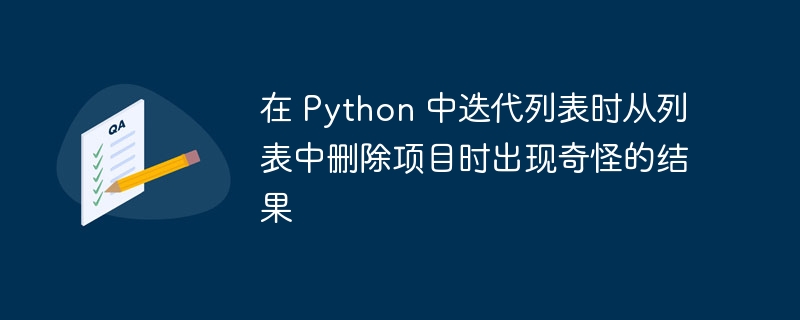

I have this code:
numbers = list(range(1, 50))
for i in numbers:
if i < 20:
numbers.remove(i)
print(numbers)
However, the result I get is:
[2, 4, 6, 8, 10, 12, 14, 16, 18, 20, 21, 22, 23, 24, 25, 26, 27, 28, 29, 30, 31, 32, 33, 34, 35, 36, 37, 38, 39, 40, 41, 42, 43, 44, 45, 46, 47, 48, 49]
Of course, I hope that no number below 20 will appear in the result. Looks like I did something wrong when deleting.
You are modifying the list while iterating over it. This means that the first time through the loop, i == 1, so 1 is removed from the list. Then the for loop goes to the second item in the list, which is not 2, but 3! It is then removed from the list and the for loop continues with the third item in the list, which is now 5. So on and so forth. Maybe it's easier to visualize this, using ^ to point to the value of i:
[1, 2, 3, 4, 5, 6...] ^
This is the initial state of the list; then 1 is deleted and the loop goes to the second item in the list:
[2, 3, 4, 5, 6...]
^
[2, 4, 5, 6...]
^etc.
There is no good way to change the length of a list while iterating it. The best thing you can do is this:
numbers = [n for n in numbers if n >= 20]
Or this, for in-place changes (the thing in the brackets is a generator expression that is implicitly converted to a tuple before the slice is assigned):
numbers[:] = (n for n in numbers if n >= 20)
If you want to perform an operation on n before deleting it, one trick you can try is:
for i, n in enumerate(numbers):
if n < 20:
print("do something")
numbers[i] = None
numbers = [n for n in numbers if n is not None]The above is the detailed content of Strange results when removing items from list while iterating over list in Python. For more information, please follow other related articles on the PHP Chinese website!




